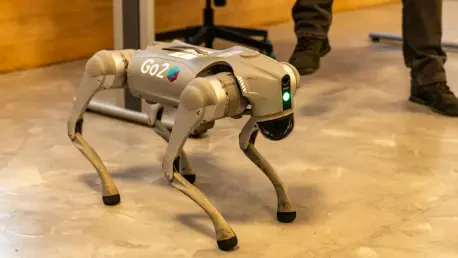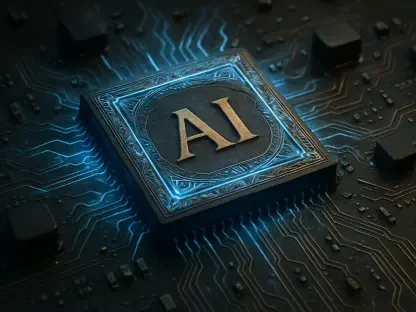Imagine stepping into a modern factory where machines don’t merely follow a set of pre-programmed commands but actively think, adapt, and make critical decisions in real-time without human intervention. This isn’t a distant dream but a tangible reality being shaped by cognitive systems powered by artificial intelligence (AI) in industrial control environments. As a cornerstone of the Industry 4.0 revolution, these advanced systems are fundamentally altering the landscape of industrial operations, shifting away from rigid, rule-based frameworks toward dynamic, intelligent solutions that learn and evolve. The integration of AI-driven cognitive systems marks a pivotal moment for industries worldwide, enabling unprecedented levels of efficiency, adaptability, and autonomy. This exploration delves into the profound transformation unfolding across industrial sectors, shedding light on how these technologies are not just tools but active participants in shaping smarter, more responsive operational ecosystems.
Redefining Automation with AI-Driven Intelligence
The journey of AI in industrial settings has taken a remarkable turn, evolving far beyond simple data processing or text generation into sophisticated autonomous agents. These agents are now capable of reasoning through complex scenarios, meticulously planning tasks, and executing actions with precision. By integrating with real-time data feeds and industrial interfaces such as SCADA systems, they transcend the limitations of traditional automation models. Their ability to interpret unfolding events and respond with agility introduces a new era of industrial operations where responsiveness is paramount. This shift represents a significant departure from static systems, allowing for a level of adaptability that was previously unattainable in conventional setups.
Moreover, the implications of this evolution extend to enhancing operational reliability across diverse industrial environments. AI agents can monitor vast arrays of sensors and data points simultaneously, identifying patterns or anomalies that might escape human notice. This continuous oversight ensures that potential issues are addressed before they escalate, minimizing downtime and boosting productivity. Unlike older systems tethered to predefined scripts, these intelligent entities adapt their strategies based on incoming information, fostering a proactive rather than reactive approach to industrial management. The result is a seamless blend of technology and operational needs, driving industries toward greater innovation.
Breaking New Ground with Cognitive Flexibility
Traditional automation, often bound by inflexible logic, is being overshadowed by the rise of cognitive automation, which introduces a remarkable degree of contextual flexibility. This new breed of AI systems learns from each interaction, refining its understanding and approach over time. When faced with unforeseen challenges or shifting conditions, these systems adjust dynamically, ensuring consistent performance in unpredictable environments. Such adaptability is a game-changer for industries that must navigate complex, ever-changing operational landscapes, setting a fresh benchmark for what automation can achieve.
Beyond adaptability, cognitive automation empowers industries to redefine efficiency on a fundamental level. By continuously improving through experiential learning, AI systems optimize processes in ways that static models cannot match. For instance, in manufacturing settings, they might recalibrate machinery settings to reduce energy consumption while maintaining output quality, based on real-time feedback loops. This capacity to self-improve not only enhances productivity but also aligns with sustainability goals, a growing priority in modern industrial strategy. As a result, cognitive systems are establishing themselves as indispensable assets in the quest for smarter, more resilient operations.
Industry 4.0: Building a Cognitive Backbone
At the core of the Industry 4.0 movement lies the integration of cognitive systems, supported by an array of cutting-edge technologies such as generative language models and secure industrial APIs. These tools form the infrastructure for intelligent networks where AI operates as interconnected cognitive nodes, facilitating decision-making across entire systems. This technological framework enables industries to construct solutions that are not only adaptive but also scalable, aligning perfectly with the vision of a fully integrated, smart industrial ecosystem that can respond to global demands with agility.
Additionally, the role of advanced reasoning frameworks within this infrastructure cannot be overstated, as they enhance the decision-making prowess of cognitive systems. By leveraging vast datasets and historical insights, these frameworks allow AI to anticipate needs and propose solutions before problems arise. This predictive capability is crucial for sectors like logistics or energy, where timing and precision are everything. The seamless connectivity provided by modern APIs ensures that data flows effortlessly between systems, creating a cohesive environment where every component works in harmony. Such integration is the bedrock upon which the future of industrial control is being built.
Tangible Innovations in Industrial Applications
One of the most compelling demonstrations of cognitive systems in action is Siemens’ Industrial Copilot, a pioneering AI solution that learns directly from technician interactions to optimize programmable logic controller (PLC) code and deliver context-specific recommendations. This innovation showcases how AI can personalize its assistance, tailoring outputs to the unique demands of specific operational environments. The practical benefits are clear, as it reduces manual effort and enhances precision in tasks that are critical to maintaining industrial workflows, proving the real-world value of cognitive integration.
Equally impressive is the application of cognitive systems in specialized sectors like water cycle management, where AI is making significant strides. From generating detailed reports and analyzing operational data to autonomously adjusting settings in pump stations or stormwater treatment facilities, these systems demonstrate versatility across domains. In such contexts, AI not only streamlines routine tasks but also tackles complex challenges, such as optimizing hydraulic ecosystems under varying conditions. These examples underscore the feasibility of cognitive technologies, illustrating their potential to transform diverse industries by addressing both mundane and intricate operational needs with equal proficiency.
Envisioning Autonomy through Collaborative Networks
The ultimate horizon for industrial control is full automation, where AI agents evolve beyond executing predefined commands to independently detecting issues, analyzing historical data, and implementing solutions with minimal human input. Under human oversight, these systems ensure safety and accountability while pushing the boundaries of what automation can achieve. This vision promises a future where industries operate with unparalleled efficiency, driven by intelligent entities that anticipate and resolve challenges before they impact productivity, reshaping the very nature of industrial management.
Central to this vision is the concept of AI as a distributed control layer, where agents collaborate across systems, sharing insights and forming an adaptive ecosystem. Unlike the isolated, rigid structures of traditional control setups, this collaborative approach fosters resilience and scalability. For instance, in a sprawling manufacturing network, AI agents at different facilities could coordinate to balance workloads or reroute resources in response to supply chain disruptions. This interconnectedness not only enhances operational fluidity but also aligns with broader goals of sustainability, offering a forward-looking blueprint for industries aiming to thrive in an increasingly complex global landscape.
Paving the Way for a Smarter Industrial Future
Reflecting on the strides made, it’s evident that cognitive systems have redefined industrial control by embedding intelligence and adaptability into the heart of operations. Their ability to learn, reason, and act autonomously marks a historic shift from static automation to dynamic ecosystems. Across various sectors, from manufacturing to water management, these technologies have demonstrated their capacity to elevate efficiency while addressing intricate challenges with precision. The phased integration of AI, starting with assistive roles and progressing to independent action under supervision, ensures that safety and reliability remain paramount in critical environments.
Looking ahead, the focus should shift toward accelerating the adoption of these systems through strategic investments in technological infrastructure and workforce training. Industries must prioritize developing robust frameworks that support seamless AI integration while maintaining stringent oversight mechanisms to mitigate risks. Collaborations between tech innovators and industrial leaders will be crucial in scaling solutions that balance autonomy with accountability. By embracing this balanced approach, the industrial sector can fully harness the transformative power of cognitive systems, setting the stage for a future where efficiency and sustainability go hand in hand.









